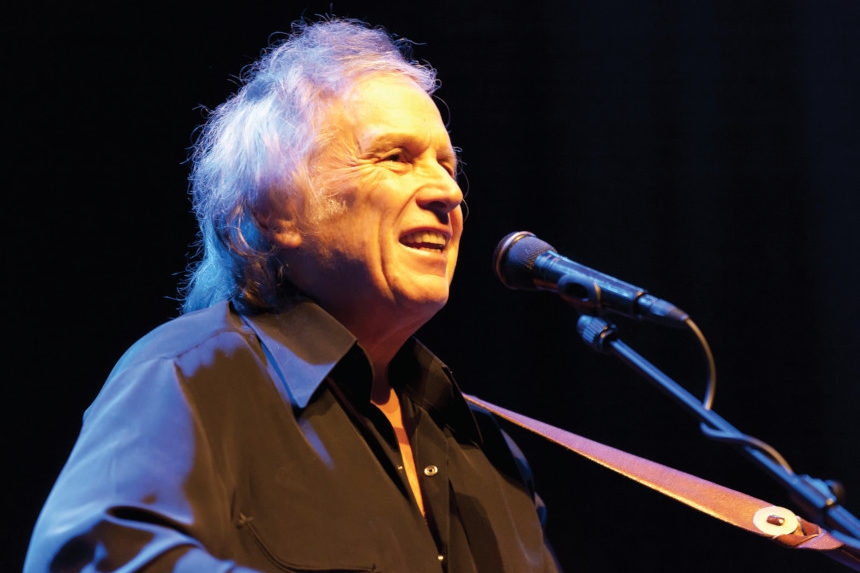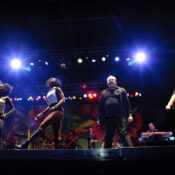McLean’s children’s book Don McLean’s American Pie: A Fable releases June 7.
Like his perennially popular song “American Pie,” Don McLean has endured. At 76, he’s in the midst of a world tour to celebrate the 50th anniversary of the song that ranks as one of the greatest ever written and still draws new generations of fans to prove it. Soon to come are the documentary The Day the Music Died, a Broadway show, and a children’s book.
McLean isn’t complaining about the fame and riches “American Pie” has brought him, even though it overshadows his other hits like “Vincent,” “I Love You So,” and “Crying” — covered by stars ranging from Perry Como to Madonna. He’s on the brink of completing a new album, American Boys, which includes a song about the tragic death of George Floyd.
McLean takes it all in self-effacing stride as he observes, “I’m shocked that I’m still around. I’m shocked that I made it this far. I buried a lot of guys I started with. Everybody I know is dead. A lot of them are statues now.”
Jeanne Wolf: You did not have the greatest childhood. Then at a very young age you became a star with one song.
Don McLean: When “American Pie” happened, it was such a gift, but there was sort of a downtime afterward, like, “He can’t follow this.” Then I did “Vincent,” which shut up the naysayers. It was totally different but almost as big a hit. I said to myself, “You’re pretty much going to be finished soon.” I was all hunkered down for failure. I never thought about the future. I never thought about whether I had any kind of safety net. I could have just as easily ended up homeless as rich and famous, and that’s true.
But that song has lasted, and people love to analyze it. What matters is that they’re enjoying it and asking questions. Questions are the key about everything — American history, music, what happened to Buddy Holly, blah, blah, blah, what happened to Kennedy. But “American Pie” is still a song that is in another realm that I don’t even understand completely.
Do you know why it takes four folk singers to change a light bulb? Three to change the bulb and one to say, “The old bulb was better!” But I don’t think my old bulb was better. I just think of “American Pie” as a very personal song about my own struggle to make it by myself. When I sing, “For 10 years, we’ve been on our own,” that’s me talking about myself.
JW: Are there musicians you listen to and admire now?
DM: Modern music is pretty much close to being garbage because there’s no structure, there’s no rules. You can only eat what you’re fed, and if you’re getting junk food, which is basically the music that I hear, then you’ve got to eat it. Okay, there’s a lot of fine musicians out there. The problem is that they don’t have a melody to play, and they don’t have the lyrics, but they play great.
I like to observe things around me for months, even years, and live my life and go through whatever changes I must go through before something will crystallize. I’ll start to write one or two songs, and if I like what I hear, I’ll say, “Okay, well, I gotta do some more now.” I’ll get up in the morning and songs are in my head and I have my phone and put it on record and sing into it. What makes me happy is when my songs give people enjoyment, moments of reflection, and bring back times in their lives that have passed. It’s always the great thing about music. There’s a recording of that song, but then there’s the memory of the recording, and that’s very powerful. The other thing is that you, the listener, have the song in your head; you can sing it, and I love it when audiences sing along when I perform.
JW: You describe yourself as a loner, but the poetry you write in your music shows a deep understanding of people.
DM: Relationships are very difficult for me, and that goes to the fact that I’ve been on my own taking care of myself since I was 15. I’m always giving the answers to everybody and not having anybody to give me any answers. I have a lot of good friends, I have a great band, I have a wonderful girlfriend, but I’m unemployable. I can’t work for anybody because I can’t ever have a boss. It’s been either sink or swim, and luckily, I swam. You can’t be running to somebody to hold your hand all the time. Sometimes it takes pain, and you work your way through it.
My mother was Italian, and she used to say, “Donny, life is not meant to be a bed of roses. You’ve got to get some thorns. It’s gonna be hard.” Now I’m on tour again, and every show I’m excited about, every single one. I can’t wait. If I can pull this off in spite of that pandemic still lurking around, I’ll be so proud of myself that I saw the world again the way I want to and sang for people who still want to hear my songs. I try not to let the success that I had mean that much to me because I realize how blessed I have been. I know how rough it is for everybody else out there who isn’t lucky enough to find a pathway in life that they love.
JW: You were sick when you were young. Is that when you started to feel different, in your own world?
DM: I was an asthmatic when I was a kid and had a tough time breathing. I was the only kid that had this in those days. Now so many have it. I was out of school all the time. I would get pneumonia and I’d be missing school, like six weeks, two months. I’d come back weak and everything. I didn’t know the kids. I couldn’t do the work, but I got through. So, I learned how to struggle through the sickness as well as struggle through the adversity of what the sickness caused, which was me to be out of whack with everything. It was a combination of being home a lot during those formative years and not, I think, being institutionalized by school.
I raised two beautiful children, and being around them was one of the great experiences of my life because they are such creative children. They sing, they dance, they paint, they come up with crazy ideas, they say amazing things. And then they go to school, and they get in line, you know, and they become propagandized into the system and they get put into the workforce. That never happened to me. And by the time it would have started to happen, when I was 16, I was a freshman in high school, my father died, and I was on my own. So now, looking back on my own childhood, I feel this combination of sadness and exhilaration.
JW: What were you thinking about such enormous success?
DM: It was all what I dreamt of, and at the same time a huge surprise. I was making several times a night what my father made a year. I was getting jobs all over the world, and I was building a career as a performer. I was an international concert star, and still am, and suddenly started playing Australia and England and all these places, and having fabulous success, not only with the concerts but with the albums I put out, number one, and top of the charts. I was building a new thing, a world career. There was a bunch of hits in the early ’80s: “Crying,” “Since I Don’t Have You,” and “Castles in the Air.” Years were going by — 10, 15 years, you know — and now it’s 50 years.
This is an extended version of an interview from the May/June 2022 issue of The Saturday Evening Post. Subscribe to the magazine for more art, inspiring stories, fiction, humor, and features from our archives.
Featured image: Shutterstock
Become a Saturday Evening Post member and enjoy unlimited access. Subscribe now




Comments
Don, it’s so great you’re touring and more active than ever at 76. You’ve defied a lot of odds over the course of your life to get where you’ve gotten today. This feature shed some autobiographical light on ‘American Pie’. I’ve never been one to get hung up on trying to figure it all out.
It’s kind of a riddle, and that’s fine. The fact is the lyrics and music go perfectly together, and always have. Another song that also came out right after it is ‘A Horse With No Name’ by America in which there’s been too much analysis of the lyrics. It just works. Just listen and enjoy both. I hope you see these comments because I have to tell you my personal favorite song of yours is ‘Dreidel’ from late ’72. The HQ version on YouTube is amazing.
The song has so many twists, turns, musical styles and speeds within it, it’s astonishing. A masterpiece that’s been overlooked for too long. I wish you many more years of health and happiness on your continued musical odyssey. As for ‘music’ today it is garbage, and sadly has been for over 30 years now. Once corporate rap and hip-hop took over, that was it. Thanks so much for being in the music biz at the right time.
Always loved Don McLean. He and John Denver are not only singer/songwriters, they are poets of the first order.